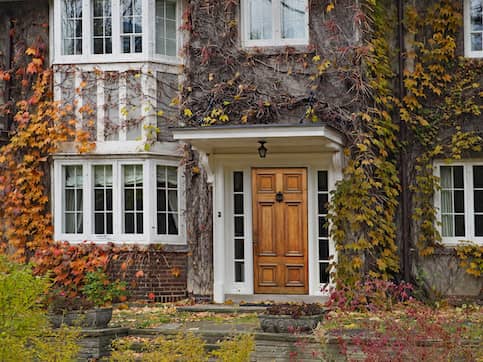Housing Season: Tips On How To Approach Peak Inventory

For any homeowner putting their property on the market, the pressing question of price arises sooner or later. The answer is a primary influence on how easily the home will sell and the condition of the seller’s financial circumstances after closing day.
While there is no simple answer or algorithm for setting a price tag on your home, this guide will help you understand the dynamics affecting home values in your region. Numerous factors can impact how you price your home, from home staging expenses to fine-tuning your asking price to fit online search tools.
Home sellers who do their research, work with real estate professionals and remain flexible tend to get a better price for their house. If you’re thinking about putting your home up for sale but have been stumped when you ask yourself, “How much can I sell my house for?” this article can help clear the air.
Take the first step toward the right mortgage.
See what you can afford.
How To Price Your Home To Sell
Selling a house is no easy endeavor, as many factors hold weight in a home sale. From getting your home ready for showings to negotiating over an appealing offer, you have a lot to consider. However, one crucial element amidst all the details is price. Use the tips below to determine the dollar figure for your listing.
Use A Comparative Market Analysis
A comparative market analysis is a tool that helps homeowners determine their home’s value. The analysis is “comparative” because it uses the value of similar homes in your neighborhood to assign a price to your home. Specifically, the analysis assesses the square footage, number of bedrooms and bathrooms, lot size, location, property age, condition, and other special features or factors to estimate the home value.
When looking to sell your home, a comparative market analysis is optional. That said, it’s a good idea to have your real estate agent conduct one. Usually, you can get a comparative market analysis for free, and it will help you set a suitable sale price.
Include All Associated Costs
When you set a price for your home, you’ll subtract various fees from that number to get a better idea of how much you’ll profit from the sale. For example, if you’re working with a real estate professional, you’ll pay real estate agent commissions. Also, if you’re sprucing up your property or making upgrades, incorporate the costs for home improvements and home staging.
Although you may think your home is in excellent condition, a home inspection could reveal multiple issues in dire need of attention. Additionally, once you sell, you’ll be responsible for closing costs and possibly taxes, depending on the timing of the sale. While you may be ready to absorb these costs, remember that if you have an outstanding balance on your mortgage, you’ll need to pay that off upon selling your home.
Find A Mortgage Today and Lock In Your Rate!
Get matched with a lender that will work for your financial situation.
Cater To Home Buyers
Once you prepare your home to sell and understand the costs involved, it’s possible to strike the right balance between a price that suits you and one that appeals to buyers in your local housing market. Pricing should be high enough to reflect the value and desirability of your home but low enough to appeal to buyers in your area.
In addition, it’s helpful to price your home with a strategy in mind. For example, you might decide to go a bit lower to entice multiple buyers, possibly instigating a bidding war that ends with an increased sale price. Or, you could hedge upwards to draw a few select buyers ready to immediately make their highest, best offers.
Working with a real estate professional can help in this specific area as well. Since real estate agents and REALTORs® constantly oversee property transactions in your area, they can make informed recommendations on how to price your home ideally.
Price For Online Search Ranges
Since home search tools have buyers set price parameters for homes on the market, setting a price just below what you prefer can help attract more buyers. For example, if your home’s value is $300,000, setting the price at $299,999 can help bring in more buyers and draw increased interest.
Otherwise, committing to stark figures can mean home search tools filtering your property out for swaths of buyers. Remember, the slightly lower price can bring in buyers who might be open to negotiating a sale that works for buyer and seller.
Online search tools aren’t just for home buyers, either. As a seller, view the homes for sale around you to understand how your price compares to the others. You could drop the price just underneath comparable homes or bump it over the average listing in your area if you feel that your home has definite perks over other offerings.
Consult A Real Estate Agent
It’s recommended that home sellers always consult a real estate agent or REALTOR® when determining pricing for their home. It’s free, and you can take advantage of their insights into the real estate market and any other expert tips and advice they offer. Real estate professionals make money through commissions at closing, and their pay is well-earned because of their knowledge of your local market and negotiating skills.
Plus, real estate professionals will list your home on the multiple listing service (MLS), the online database where buyers will find your home for sale. Your agent will also schedule showings and give pointers on staging your home. As a result, working with a real estate agent will help you sell your home as quickly and profitably as possible.
Although many real estate agents have experience with all kinds of properties, make sure you work with someone who understands your specific situation and is comfortable selling your property. Single-family homes, condos, townhouses and other property types sometimes have distinct nuances and issues. Therefore, a real estate agent with a track record of selling the type of property you have can help you navigate tricky circumstances.
The real estate agent who helped you buy your home could be an excellent candidate for assisting you with selling. You could also gather referrals from family and friends if you don’t have a real estate agent yet. Additionally, you could look online for highly reviewed real estate agents or find the agents managing other properties for sale in your neighborhood.
Know The Market
Knowing the supply and demand of the real estate market is essential when trying to sell a house. Whether the market is a buyer’s market, seller’s market, or a neutral market will impact how you price your home.
For example, a buyer’s market often means a surplus of homes for sale, so pricing dips to cater to the limited number of buyers. Conversely, a seller’s market has the opposite conditions, where the tight supply of homes drives up the price as numerous buyers attempt to outcompete each other for the scarce number of homes available.
If you’re in a neutral market, the supply and demand for homes are balanced, and neither buyer nor seller has any significant advantage regarding price. Often, smaller details and nuance hold sway, and negotiations are significant.
For example, a buyer who allows the seller to remain in the home for 60 days after closing might have the edge over less-flexible buyers. Or, a seller who is willing to cover the buyer’s closing costs may appeal to more buyers in a stagnant market.
See What You Qualify For
Home Purchase
Home Refinance
Tap Into Equity
How Much Can I Sell My House For Right Now?
Sometimes, the best-laid plans can go awry because of the tiniest details, and selling your home is no exception. It’s a good idea to remain flexible in unforeseen situations. For example, one of your appliances might give out a few days before you start showing your home. In that case, you’ll have to decide whether to pay to fix it or account for it in your sale price.
In addition, it’s vital to remember that you can’t go higher after you set a price, but you can go lower. If you anticipate complex negotiations or fluctuations in the market, it may be a good idea to set an initially high price with intentions to decrease the figure as needed.
Finally, while running a comparative market analysis and speaking to a real estate agent are crucial, your judgment and research will be instrumental in coming up with the best price for your home. Many factors will impact your selling price, like bidding wars, market type, negotiations, mortgage rates, seasonal trends and local competition.
The Bottom Line
While selling your home for the right price may be daunting, it’s possible to set a price that works for your budget and fits the range of buyers in your market. Developing knowledge of your local real estate scene and working with professionals will allow you to make an informed decision for pricing your home. However, since new dynamics and trends can hit the housing market at any time, it’s critical to adapt as your house selling journey unfolds.
If you’re about to put your house on the market, use the following tips and checklist to get your house ready to sell.
Find A Mortgage Today and Lock In Your Rate!
Get matched with a lender that will work for your financial situation.











